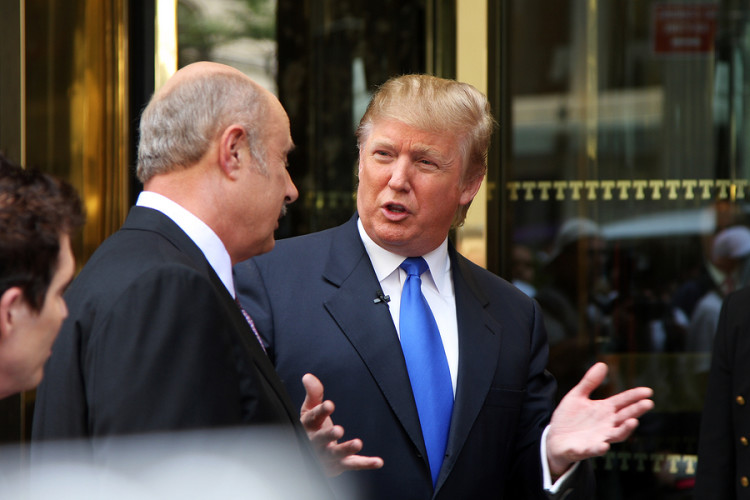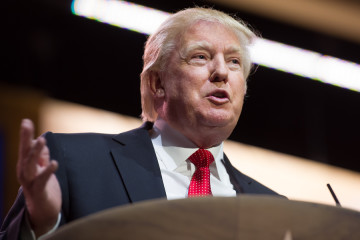Trump Woos Democrats on Tax Overhaul at White House Dinner

published Sep 12, 2017 8:28:46 PM, by John Voskuhl
(Bloomberg) —
Three Democratic senators joined President Donald Trump for a White House dinner Tuesday aimed at winning their support for an as-yet unreleased tax overhaul bill that would be written by Republican leaders.
Trump’s guests — Joe Manchin of West Virginia, Heidi Heitkamp of North Dakota and Joe Donnelly of Indiana — are the only three Democratic senators who haven’t signed on to a list of conditions for supporting any tax legislation: that it not add to the federal deficit, that it not increase the burden on the middle class and that it go through the regular order process in Congress.
In reaching out to them, Trump is amplifying a White House strategy that seems squarely aimed at Democrats. It calls for the president to rally support for tax legislation by visiting states he won in 2016 where a Democratic senator is up for re-election next year. But with many details of the legislation still unclear, the strategy’s effectiveness remains to be seen.
Manchin, who faces re-election in a state Trump won by 42 points, said any plan must not add to the national debt.
“We had a productive conversation about areas of agreement as well as areas where we will have to find compromise,” Manchin said in a statement after the dinner. “I will continue to fight for a simpler tax code that lowers rates for West Virginians and incentivizes Main Street businesses to invest and grow in America, but we must do this without adding to our staggering debt.”
‘Devil in Details’
Donnelly said he was pleased that Trump supports measures that would address “the outsourcing of American jobs.” Donnelly introduced legislation in January that would support U.S. companies that hire American workers and penalize those that outsource jobs offshore. “I am hopeful we can work together to encourage domestic investments that benefit American workers,” he said.
Vice President Mike Pence plans three visits to his home state of Indiana, where he will pitch the need for a tax revamp, according to a White House aide. Those trips, along with the Tuesday dinner, are part of efforts to pressure Donnelly to support a tax overhaul, the aide said.
Heitkamp, after Trump took her with him on a trip to North Dakota last week to pitch the tax overhaul — released a statement saying “the devil is in the details of any reform plan” and “we need to know what those details are.”
“Tonight we had a good discussion and I reinforced that any tax reform bill must support working families and family farmers so they aren’t burdened with debt and it must stand up for retirees who want to live their remaining years with dignity while also simplifying the tax code and lowering compliance burdens,” she said in a statement Tuesday night.
Other invited dinner guests included Orrin Hatch of Utah, who chairs the Senate Finance Committee, John Thune of South Dakota, the No. 3 ranking Republican, and Pat Toomey of Pennsylvania.
Republican leaders in Congress would like to have Democratic support for their eventual tax proposal, but they aren’t banking on it, nor are they shaping their plans for the purpose of winning Democratic support, according to GOP leadership aides. Rejecting Democratic calls, they still intend to proceed on a fast-track basis under reconciliation, which allows them to avoid the 60-vote threshold in the Senate if the bill meets certain conditions.
Trump administration officials have nonetheless said they’d prefer to seek bipartisan support for a tax bill.
Middle-Class Families
Even before the three Democrats sat down with Trump, Senate Democratic Leader Chuck Schumer held a conference call with reporters Tuesday afternoon that was designed to re-emphasize his party’s conditions for tax legislation.
“Now, we Democrats want to actually achieve tax reform in this country, but we can do so in a way that doesn’t sacrifice our principles or sell out working and middle class families to accomplish it,” Schumer said.
Although members of Trump’s administration have been meeting with congressional leaders through the summer — and most recently on Tuesday afternoon — details of their planned legislation have yet to emerge. It’s unclear where they intend to set the corporate tax rate, how they intend to arrange tax brackets for individuals and which tax breaks they’d propose to eliminate to pay for rate cuts.
While Treasury Secretary Steven Mnuchin and National Economic Council Director Gary Cohn have both suggested that high earning individuals might not see any effective tax cut from the bill, some proposals — including eliminating the estate tax and the alternative minimum tax — drew Schumer’s condemnation as boons for the rich ahead of Tuesday night’s meeting.
“Now unfortunately, the drips and drabs we’ve heard of the Republican plan so far reveal a tax plan designed to benefit the ultra-rich while leaving the middle class in this country out to dry,” Schumer said.
Corporate Compromise
He said that eliminating the estate tax, which applies only to estates worth more than $5.49 million for individuals and $10.98 million for married couples, would be a break “for the wealthy elites in this country the President promised to stand up to.”
Also on Tuesday, a pair of administration officials signaled the president’s goal of cutting the corporate income-tax rate to 15 percent — down from 35 percent — may be open to compromise. Mnuchin and Marc Short, White House legislative affairs director, both said Trump is still committed to a 15 percent rate, but they acknowledged the potential for compromise.
House Speaker Paul Ryan said last week that the goal for the corporate rate is “to be at or below the industrial world average,” which is in the mid-20s range.




No Comment